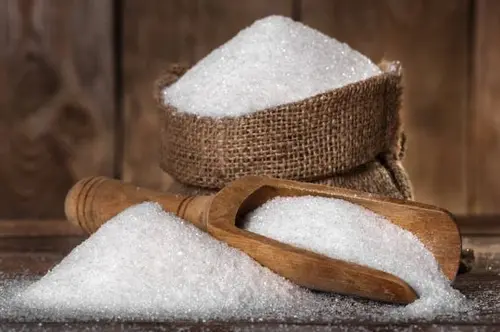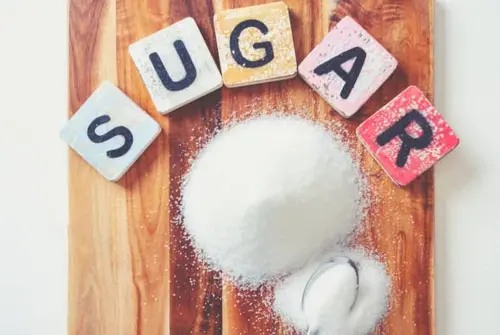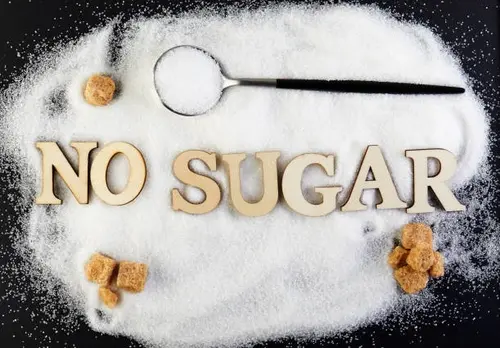Are you having the right form of sugar that provides you energy or that gives you those belly curls?
No, Don’t worry. I am here to tell you, which type of sugar is best for you. This article uncovers How does Sugar affect weight loss, How to avoid Sugar, and Which type of Sugar you must include in your diet?
Sugar is found in most of the food we consume, in natural form and processed form.
But do you know how sugar is processed? Sugar is produced from sugarcane and is processed in industries. Then sugar passes through many stages of refining where chemicals like calcium hydroxide, sulphur dioxide, lime, phosphoric acid, and activated carbon are added.
This makes the sugar unhealthy because the refining process takes out all nutrients, vitamins, and minerals from it. Consuming this refined sugar causes health problems like weight gain, type 2 diabetes, and imbalance of hormones and affects metabolism.
Does that mean you need to cut down on sugar completely? Yes, you need to cut down on added sugar foods that cause weight gain.
Also read: A Comprehensive Guide on How to Lose Weight While Working From Home
As per WHO study, adults and children need to reduce their added sugar or processed sugar intake to less than 10% to maintain a healthy body.
Our body needs natural sugar which we can get from food like fruits, vegetables, grains, nuts, etc. These sources are not only a good source of sugar but also give you vitamins, fiber, and antioxidants.
Table of Contents
What is Sugar?
Sugar is a name given to sweet-tasting foods. Sugar is sucrose. They are carbohydrates, which include glucose, fructose, lactose, galactose, maltose, and trehalose.
There are two types of sugar: natural and added sugar. Natural sugar is available in fruits, vegetables, nuts, and dairy products. Added sugar is available in any packaged food, processed food, and sweet beverages.
Also read: Unlocking the Key to a Slimmer Body: Are Kiwis Good for Losing Weight?

Different Forms of Sugar
Are you aware of different forms of sugar? Here’s a list of different types of sugar present in different food items.
Glucose
❖ Type: Monosaccharide
❖ Sources: Fruits, vegetables, grains
❖ Function: Primary source of energy for the body, readily absorbed and used by cells.
❖ Impact:
➢ Positive: Essential for energy production, supports brain function and cognitive performance.
➢ Negative: Excessive intake can contribute to weight gain and diabetes.
Fructose
❖ Type: Monosaccharide
❖ Sources: Fruits, honey, high-fructose corn syrup (HFCS)
❖ Function: Provides sweetness and contributes to fruit flavor.
❖ Impact:
➢ Positive: Enhances sweetness perception and adds flavor complexity.
➢ Negative: High intake from HFCS can contribute to weight gain, fatty liver disease, and metabolic syndrome.
Sucrose
❖ Type: Disaccharide (composed of glucose and fructose)
❖ Sources: Sugar cane, sugar beets, table sugar, processed foods
❖ Function: Provides sweetness and improves the texture of food.
❖ Impact:
➢ Positive: Enhances flavor and texture, is readily absorbed, and provides energy.
➢ Negative: Excessive intake can lead to weight gain, and tooth decay, and contribute to metabolic disorders.
Lactose
❖ Type: Disaccharide (composed of glucose and galactose)
❖ Sources: Milk and dairy products
❖ Function: Provides sweetness and energy in milk, and supports the development of gut bacteria.
❖ Impact:
➢ Positive: Essential nutrient for infants and young children, supports gut health.
➢ Negative: Lactose intolerance can cause digestive issues like bloating, gas, and diarrhea.
How the Body Process Different Types of Sugar?
Sugar is a form of carbohydrate. The body converts all carbohydrates to glucose. These carbohydrates are further divided into simple and complex ones. Here is a list of how they impact our bodies.
Also read: Unmasking the Untold Benefits: Is Curd Good for Weight Loss?

Glucose
The body uses this form of sugar for energy. Glucose gets rapidly absorbed into the bloodstream after digestion. It triggers insulin release from the pancreas to facilitate glucose uptake by cells. Sugar is stored as glycogen in the liver and muscles for future energy needs. But excess glucose stored in our body is fat.
Fructose
Fructose can contribute to the synthesis of triglycerides and fat accumulation. Though it has a limited impact on blood sugar levels, it may lead to insulin resistance over time. Also, having excess fructose consumption can lead to metabolic disorders.
Sucrose (Table sugar)
Sucrose is broken down into equal parts glucose and fructose during digestion. It also provides metabolism to the body like glucose and fructose. Sucrose when taken in high quantity can cause fatty liver even if you do not consume alcohol.
Lactose (Milk sugar)
Lactose is broken down by the enzyme into lactase in the small intestine. Then it converts into glucose and galactose. It is also used in energy utilization after getting absorbed in the bloodstream.
How Does Sugar Affect Weight Loss?
Sugar can lead to many health issues, weight loss is one of them. Here’s a list of how intake of sugar impacts body weight
High Calories
Even though you didn’t have any sweet dishes and didn’t take any extra sugar in your tea or coffee, if you had a packet of chips, you would still have consumed sugar. Since all the packaged, processed, and healthy beverages have added sugar in them.
As per a study conducted by the National Library of Medicine, there is 74 percent more added sugar in processed food and packaged food which leads to a high intake of calories in our bodies.
Having an excess of such foods makes you consume more calories, which in turn leads to weight gain.
Insulin Resistance
Having a high amount of sugar triggers insulin. Insulin is a hormone that absorbs sugar from the bloodstream. But due to more sugar consumption, the cells become resistant to insulin which leads to type-2 diabetes and obesity.
In a study done by the National Library of Medicine, people who get 25 percent of their calorie intake from added sugars are highly prone to insulin resistance.
Increases Hunger
Sugar being tasty makes the body crave more. This results in not satisfying hunger. It disturbs the working of the hormone called leptin. Leptin’s basic function is to send our brain a signal that the body is full.
Due to hormones being disturbed and not signalling effectively you tend to feel hungry, which leads to overeating and weight gain.
Affects Metabolism
Having a high-sugar diet reduces the calories burned after meals and impacts the metabolism. The calories that don’t get burned out are stored as fats in the body, that how it reduces our metabolism and causes hindrances to weight loss.
Increases Inflammation
Consuming sugar in high amounts causes low-grade inflammation in the body. There can be a serious impact due to inflammation in the body leading to chronic diseases like heart disease, obesity, and type 2 diabetes.
Stores Fat
When the body is overpumped with sugar that it cannot burn to provide us with energy, it gets stored as fat. This fat is stored in the middle of the body which is the belly area. The stored fat causes obesity, and weight gain and increases the risk of mental disorders.
Challenges in Reducing Sugar for Weight Loss
Reducing sugar can be a difficult task when trying to lose weight. Here are some of the common challenges you might have to face while reducing sugar.
Also read: Unveiling the Hidden Power: Are Dragon Fruits Good for Weight Loss?

Sugar Addiction
Having sugar gives our brain a sense of pleasure. This is why many people are addicted to sugar and avoiding it can be challenging.
Emotional Trigger
Sugar is also a comfort food for many in the form of desserts or sweet beverages. Many individuals have sweets while they are stressed, and this also leads to overeating of sweets.
Social and Cultural Events
When meeting friends and family for celebrations or festivals, you often cannot leave the gathering without indulging in sweets.
Headaches and Fatigue
When you go on a diet suddenly your body is deprived of sugar and you may face tiredness, headaches, and irritability. This will make you want to cheat and have something unhealthy that may have added sugar.
Sugar Cravings
Having a low-sugar diet will make you crave something sweet. Resisting your mind from eating any sweets becomes very difficult.
Substitute of Sugar in Weight Loss
It’s important to cut down on sugar while losing weight, but you can choose a substitute. Have a sugar substitute that is less harmful and has better nutrition compared to refined sugar. Here is a list of the sugar substitutes you can have for weight loss:
Stevia
It is a sugar alternative that is natural and has zero calories. It is possible that when you replace refined sugar with stevia you get a different taste than sugar but it is also sweeter than sugar. It helps in preventing weight gain and no spike in blood sugar levels.
Monk Fruit Sweetener
This is again a plant-based sugar alternative. It has zero calories and is found in monk fruit. Monk fruit sweeteners are on the sweeter side than regular table sugar. Since the sugar doesn’t have any calories, it promotes weight loss and balances blood sugar levels.
Allulose
Allulose is a sugar found in fruits like figs and raisins. The sugar is less sweeter than refined sugar and only gives 0.2 calories per gram. One of the benefits of having this sugar is it good for gut health. Also does not have a negative impact on insulin levels.
Sugar Alcohol
There are two sugar alcohols, Erythritol and Xylitol. You can find this sugar in vegetables and fruits. Sugar Alcohol contains less sugar compared to table sugar and is low in calories.
They are safe to consume because they do not affect sugar levels, but if consumed more than the limit may cause stomach upset.
Coconut sugar
Coconut sugar has a lower glycemic index and has a slow impact on blood sugar levels. Coconut sugar is not a zero-nutrient sugar. It contains potassium, iron, and magnesium. But it’s not zero-calorie, hence have it within limits to avoid gaining weight.
Honey
Honey is one of the natural sweeteners that has antioxidants and antimicrobial properties. Honey is also good for the gut. You can have honey but in limited quantity because it may impact blood sugar since it is not a zero-calorie sweetener.

Jaggery
Jaggery is a natural sweetener with vitamins and minerals. Jaggery is available in unrefined and less processed form which does not have a very negative impact on the body. Have it in moderate quantity as it contains a high glycemic index which can spike blood sugar levels and has the same calories as regular sugar.
Tips on Managing Sugar Intake
Sugar is related to weight loss, therefore managing sugar intake is very important. Here are some tips to manage sugar intake.
Avoid having store-bought beverages, instead opt for water, fresh juice, lemon juice, or unsweetened tea or coffee.
Cook your meals at home to reduce the consumption of added sugar, since all instant meals contain a high amount of sugar.
Also read: Is Eating Watermelon at Night Good for Weight Loss?
Read food labels carefully to learn about hidden sugar forms like sucrose and corn syrup that can impact body weight.
Try having whole foods like vegetables, fruits, and whole grains instead of packaged or processed foods. They will provide natural sweetness to the body and won’t make you crave sweets.
Avoid having sauces, jams, spreads, or salad dressings. They all have a high amount of added sugar.
Have a protein-rich breakfast instead of cereal. Protein will give the body energy and keep you fuller for a longer period of time.
Snack on healthy foods like nuts and fruits. This will help calm your temptations.
Don’t skip meals.
This can lead to intense cravings when hungry.
Add spice and herbs to your cooking for a flavor boost without sugar. The choices between cinnamon, ginger, nutmeg, and vanilla are excellent.
Conclusion
Avoiding sugar intake during your weight loss journey will surely reward you with the weight goals you have dreamed of. A small change will have a big impact. Sugar temptations can be difficult to manage but you can replace them with healthy ones.
You have learned about How does Sugar affect weight loss? how to avoid it, and what alternatives to sugar won’t cause any hindrance to weight loss.
Every alternative has benefits and drawbacks. Choose your alternative as per your body and understand the limit of sugar that is healthy for your body. Follow some of the above tips to avoid or manage sugar cravings.
Reducing your intake of sugar will not only help you lose weight but also reduce the risk of developing chronic diseases like heart disease, obesity, or type 2 diabetes.
Remember, you have the power to create a healthier future for yourself by being mindful of what you let into your body.
Frequently Asked Question
Q1: How many grams of sugar a day should I have for weight loss?
Ans: You can have 200 calories from sugar a day for a 2000-calorie diet. If you can reduce intake to 10 percent a day, you can lose weight.
Q2: Is fruit sugar bad for weight loss?
Ans: Fruit sugar is not bad for weight loss. You can consume two fruits a day. Fruits are packed with fiber, nutrients, and antioxidants. They keep you fuller and help avoid sweet cravings.
Q3: Can I replace sugar with honey for weight loss?
Ans: Though honey is naturally sweet it has similar calories compared to table sugar. Hence it’s better to choose a zero-calorie alternative.
Q4: Is coconut sugar good for weight loss?
Ans: Though honey is naturally sweet it has similar calories compared to table sugar. Hence it’s better to choose a zero-calorie alternative.
